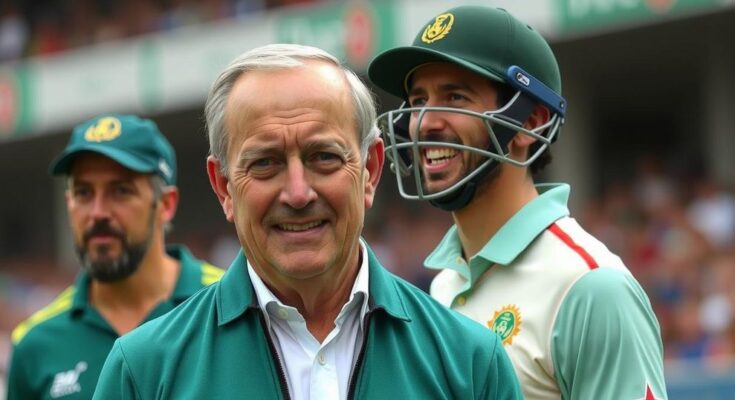Baroness Foster and multiple Northern Irish MPs support a boycott of the England men’s cricket match against Afghanistan due to the Taliban’s oppression of women. This political action seeks to raise awareness of the severe restrictions placed on women in Afghanistan since 2021. The ECB has not committed definitively to a boycott but acknowledges the calls for a unified international response to the situation.
The former First Minister of Northern Ireland, Baroness Foster, has called upon the England men’s cricket team to boycott their upcoming match against Afghanistan as a protest against the Taliban’s oppressive policies towards women. Foster is one of a coalition of Northern Irish parliamentarians supporting the boycott, which includes over 160 MPs who have voiced concerns over the Taliban’s treatment of women since assuming power in 2021. With England scheduled to play Afghanistan on February 26 during the Champions Trophy, the push for a boycott aims to condemn the regime’s severe restrictions on women’s rights, education, and sports participation.
Numerous local politicians from various parties, including the Democratic Unionist Party, the Alliance Party, and the Ulster Unionist Party, have rallied behind the call to boycott. Social Democratic and Labour Party MP Claire Hanna highlighted how the Taliban have intertwined sports and politics to enforce harsh limitations on female athletes, making this issue both a sports and human rights matter.
The England and Wales Cricket Board (ECB) expressed its commitment to addressing the situation, although they have not taken a definitive stance on the proposed boycott. In a letter from Labour MP Tonia Antoniazzi, who chairs the Northern Ireland Affairs Committee, the ECB was urged to refuse to play in order to send a strong message against the Taliban’s grotesque abuses of women’s rights. The letter emphasized the dire situation of the Afghan women’s cricket team, many of whom have fled the country due to the oppressive regime.
Signatories of this letter include prominent political figures such as former Labour leaders Jeremy Corbyn and Lord Kinnock, as well as Nigel Farage, the leader of Reform UK. Foster, in her statements to BBC News NI, noted that while she is generally not in favor of boycotts, the Taliban’s actions necessitate a response to advocate for Afghan women’s rights. She stated, “the actions of the regime in Afghanistan absolutely mark the country out as a rogue nation.”
In conclusion, the gravity of the situation has prompted a collective political push for the England cricket team to take a stand against Afghanistan’s oppressive policies. The ECB’s exploration of a coordinated international response indicates a growing awareness of the need to stand against human rights violations, especially those targeting women. The support from MPs and peers across Northern Ireland reflects a critical stance against injustices faced by women globally, particularly under the Taliban’s rule.
The call for a boycott of the England men’s cricket team’s match against Afghanistan stems from the significant human rights abuses perpetrated by the Taliban, particularly concerning women’s rights. Since the Taliban’s takeover in Afghanistan in 2021, women have been systematically stripped of their rights, including access to education and the opportunity to participate in sports. The issue has garnered attention on an international scale, with various parliamentarians advocating for action against such violations. The cricket match is not merely a sporting event but a potential platform for raising awareness regarding these critical human rights issues.
The campaign for a boycott against Afghanistan’s cricket match highlights the intersection of sports and human rights, particularly in relation to the treatment of women under Taliban rule. The unification of various political figures in support of this movement indicates a significant concern over the repression of women’s rights in Afghanistan. The ECB’s response will be instrumental in determining whether sporting organizations can act as advocates for social justice and human rights, paving the way for greater awareness and support for those in oppressed situations.
Original Source: www.bbc.com




